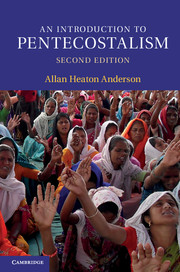Book contents
- Frontmatter
- Contents
- Acknowledgements
- Preface
- Abbreviations
- Chapter 1 Introduction
- Part I History
- Part II Analysis
- Chapter 9 Theology of the Spirit
- Chapter 10 Mission and evangelism
- Chapter 11 Bible and ‘full gospel’
- Chapter 12 Academy and ecumenism
- Chapter 13 Gender and society
- Chapter 14 Politics and economics
- Chapter 15 Globalization and prospects
- Bibliography
- Index
Chapter 12 - Academy and ecumenism
Published online by Cambridge University Press: 05 June 2014
- Frontmatter
- Contents
- Acknowledgements
- Preface
- Abbreviations
- Chapter 1 Introduction
- Part I History
- Part II Analysis
- Chapter 9 Theology of the Spirit
- Chapter 10 Mission and evangelism
- Chapter 11 Bible and ‘full gospel’
- Chapter 12 Academy and ecumenism
- Chapter 13 Gender and society
- Chapter 14 Politics and economics
- Chapter 15 Globalization and prospects
- Bibliography
- Index
Summary
Pentecostals and academic theology
To some, the words ‘Pentecostal’ and ‘academic theology’ are mutually exclusive, even antagonistic words. Most early Pentecostal leaders and some of their most successful pastors in many parts of the world have been those with little or no theological education. In the 1960s, Swiss sociologist Lalive d’Épinay contrasted the remarkably successful Pentecostal pastors in Chile with little or no education and what he called the ‘complete stagnation’ of the Methodist and Presbyterian churches with their highly educated ministers. This made him doubt the benefits of theological education and western training methods imposed on Protestants in developing nations which were unsuitable for the needs in Chile. Sepúlveda writes that because US Protestant missionaries instituted theological education to avoid what they claimed were the ‘excesses’ and ‘ignorant fanaticism’ of Pentecostalism, Chilean Pentecostalism now had a strong anti-theological, anti-academic prejudice.
To qualify for leadership, the emphasis usually has been on the spirituality and call of the leader rather than on intellectual abilities or ministerial skills. The first Pentecostal training college in Europe provided rudimentary training for missionary candidates, who simply had to have a good knowledge of the Bible and the doctrines of salvation and sanctification, and to have had a personal experience of Spirit baptism. There was no shortage of applications and entrance criteria subsequently became more difficult, including a required two-year training period. As denominations institutionalized, so the training requirements for pastors and missionaries increased. More recently, in theological education offered outside their own institutions, Pentecostals and Charismatics often have had to deal with a liberal, modernist and pluralistic theological agenda which often seems to be diametrically opposed to Pentecostal spirituality and its frequent tendency towards exclusivity. A certain tension exists between academic integrity and spirituality, especially when education does not seem to further spirituality. As a result, there has been a tenuous relationship with theological education, and Pentecostal leaders have written of a ‘dead intellectualism’ that sometimes ‘stifles the Spirit-filled life’. The European university model that pervades education in western societies creates an educated elite that often loses touch with ordinary people. This has affected Pentecostals and Charismatics too, where the clergy/laity dichotomy that they shunned in the past has been restored through an emphasis on the need for a theological qualification before recognizing a calling and gifting for ministry.
- Type
- Chapter
- Information
- An Introduction to PentecostalismGlobal Charismatic Christianity, pp. 242 - 262Publisher: Cambridge University PressPrint publication year: 2013



